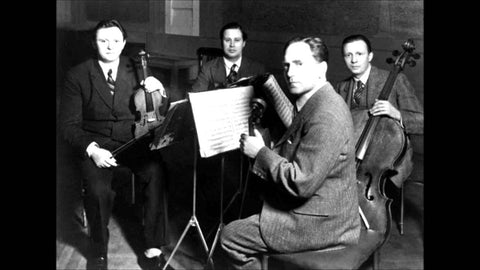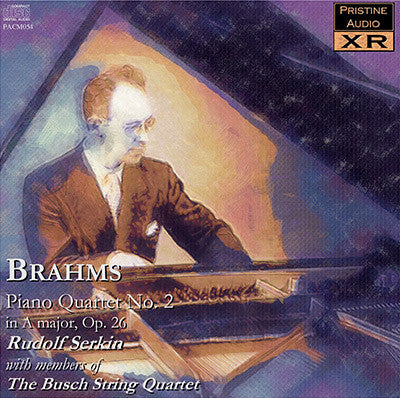Busch Quartet

The Busch Quartet was a string quartet founded by Adolf Busch in 1919 that was particularly noted for its interpretations of the Classical and Romantic quartet repertoire. The group's recordings of Beethoven's Late String Quartets are especially revered.
The Busch Quartet's playing represented a transition between the earlier style of the Joachim, Ysaÿe or Rosé Quartets, in which the leader was paramount, and the more modern approach exemplified by the Budapest or Smetana Quartets, in which every player had an equal role. However Busch still dominated his colleagues to an extent, through both his strength of personality and the sheer weight and quality of his tone.
This move towards a more egalitarian approach was reflected in the Quartet's seating arrangements. The classic seating plan for a quartet, typified by the Joachim Quartet, was to have the two violinists facing one another, with the cellist and violist to the rear. The Busch Quartet originally favoured this scheme but by 1930 had changed to the layout with the second violinist on the leader's left, the cellist at the back and the violist facing the leader. This formation prevented the slower-speaking viola from being heard fractionally after the bass line, as could occur when the cello was placed at the front.
A reflection of an earlier musical style was the Busch players' use of portamento, although they were less liberal in its application than the Rosé, Bohemian or Léner ensembles. In rehearsal they concentrated on intonation, balance, precision of ensemble, rhythm and articulation, leaving phrasing and fingering at least partly to the inspiration of the concert hall. For instance, when it came to a recital or recording session, one member of the Quartet might make a spontaneous portamento but the player of the answering phrase might not, because it did not occur to him to do so at that moment.
In spite of such hangovers from the 19th century, Busch and his colleagues were pioneers in their day, bringing a new forcefulness to bear on the music of Beethoven, Brahms and Schubert, and bowing very much 'into the string', with more vibrato than had been typical at the time. They were adept at intensifying or withdrawing vibrato to mark the entry of a new voice in a contrapuntal texture, and could play without vibrato like the Capet Quartet where it seemed appropriate, for instance in a chorale passage. Another trademark was their vast range of dynamics, but although they had the tonal wherewithal to command a large space, they preferred to play rooms which bore some relation to those that Haydn, Mozart or Beethoven might have known.

Busch Quartet
The Busch Quartet was a string quartet founded by Adolf Busch in 1919 that was particularly noted for its interpretations of the Classical and Romantic quartet repertoire. The group's recordings of Beethoven's Late String Quartets are especially revered.
The Busch Quartet's playing represented a transition between the earlier style of the Joachim, Ysaÿe or Rosé Quartets, in which the leader was paramount, and the more modern approac...
BRAHMS Piano Quartet No.2 in A, Op. 26
Recorded Abbey Road Studio 3, London, 21 September 1932
Duration 39:16
Rudolf Serkin, piano
Members of The Busch Quartet:
Adolf Busch, violin
Karl Doktor, viola
Hermann Busch, cello
- Previous
- Page 2 of 2
-
Next

